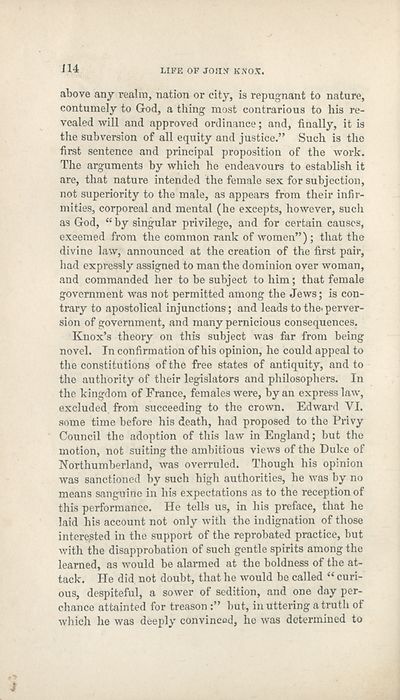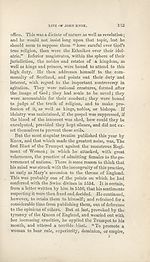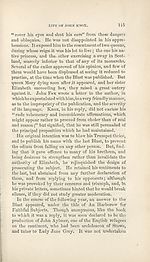Download files
Complete book:
Individual page:
Thumbnail gallery: Grid view | List view

114 LIFE OF JOHS KNOX.
above any realm, nation or city, is repugnant to nature,
contumely to God, a thing most contrarious to his re¬
vealed will and approved ordinance; and, finally, it is
the subversion of all equity and justice.” Such is the
first sentence and principal proposition of the work.
The arguments by which he endeavours to establish it
are, that nature intended the female sex for subjection,
not superiority to the male, as appears from their infir¬
mities, corporeal and mental (he excepts, however, such
as God, “ by singular privilege, and for certain causes,
exeemed from the common rank of women”) ; that the
divine law, announced at the creation of the first pair,
had expressly assigned to man the dominion over woman,
and commanded her to be subject to him; that female
government was not permitted among the Jews; is con¬
trary to apostolical injunctions; and leads to thei perver¬
sion of government, and many pernicious consequences.
Knox’s theory on this subject was far from being
novel. In confirmation of his opinion, he could appeal to
the constitutions of the free states of antiquity, and to
the authority of their legislators and philosophers. In
the kingdom of France, females were, by an express law,
excluded from succeeding to the crown. Edward VI.
some time before his death, had proposed to the Privy
Council the adoption of this law in England; but the
motion, not suiting the ambitious views of the Duke of
Northumberland, was overruled. Though his opinion
was sanctioned by such high authorities, he was by no
means sanguine in his expectations as to the reception of
this performance. He tells us, in his preface, that he
laid his account not only with the indignation of those
interested in the support of the reprobated practice, but
with the disapprobation of such gentle spirits among the
learned, as would be alarmed at the boldness of the at¬
tack. He did not doubt, that he would be called “ curi¬
ous, despiteful, a sower of sedition, and one day per¬
chance attainted for treason :” but, in uttering a truth of
which he was deeply convinced, he was determined to
above any realm, nation or city, is repugnant to nature,
contumely to God, a thing most contrarious to his re¬
vealed will and approved ordinance; and, finally, it is
the subversion of all equity and justice.” Such is the
first sentence and principal proposition of the work.
The arguments by which he endeavours to establish it
are, that nature intended the female sex for subjection,
not superiority to the male, as appears from their infir¬
mities, corporeal and mental (he excepts, however, such
as God, “ by singular privilege, and for certain causes,
exeemed from the common rank of women”) ; that the
divine law, announced at the creation of the first pair,
had expressly assigned to man the dominion over woman,
and commanded her to be subject to him; that female
government was not permitted among the Jews; is con¬
trary to apostolical injunctions; and leads to thei perver¬
sion of government, and many pernicious consequences.
Knox’s theory on this subject was far from being
novel. In confirmation of his opinion, he could appeal to
the constitutions of the free states of antiquity, and to
the authority of their legislators and philosophers. In
the kingdom of France, females were, by an express law,
excluded from succeeding to the crown. Edward VI.
some time before his death, had proposed to the Privy
Council the adoption of this law in England; but the
motion, not suiting the ambitious views of the Duke of
Northumberland, was overruled. Though his opinion
was sanctioned by such high authorities, he was by no
means sanguine in his expectations as to the reception of
this performance. He tells us, in his preface, that he
laid his account not only with the indignation of those
interested in the support of the reprobated practice, but
with the disapprobation of such gentle spirits among the
learned, as would be alarmed at the boldness of the at¬
tack. He did not doubt, that he would be called “ curi¬
ous, despiteful, a sower of sedition, and one day per¬
chance attainted for treason :” but, in uttering a truth of
which he was deeply convinced, he was determined to
Set display mode to:
![]() Universal Viewer |
Universal Viewer | ![]() Mirador |
Large image | Transcription
Mirador |
Large image | Transcription
| Antiquarian books of Scotland > Scotland/Scots > Life of John Knox ; and, The life of Alexander Henderson > (132) |
|---|
| Permanent URL | https://digital.nls.uk/131833888 |
|---|
| Description | Thousands of printed books from the Antiquarian Books of Scotland collection which dates from 1641 to the 1980s. The collection consists of 14,800 books which were published in Scotland or have a Scottish connection, e.g. through the author, printer or owner. Subjects covered include sport, education, diseases, adventure, occupations, Jacobites, politics and religion. Among the 29 languages represented are English, Gaelic, Italian, French, Russian and Swedish. |
|---|

